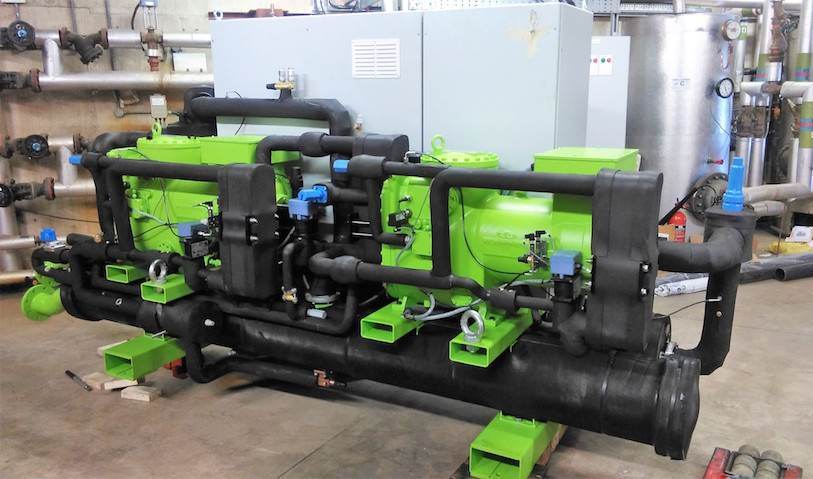Surface Water Source Heat Pumps - SWSHP
A Surface Water Source Heat Pump system works by recovering the solar energy stored naturally in river water, open water or the sea. Water is passed through heat pumps to yield its low grade heat before being returned to the river with a temperature change of around 3°C.
The Energy Secretary has described water source heat pumps as "game changing" in relation to Britain's need for renewable energy against the backdrop of insecurity in Russia, which supplies much of Europe's gas, and the political row at home over soaring fuel bills.
Officials at DECC have been asked to draw up a Water Source Heat Map showing where renewable heat can be drawn from water to exploit the potential of heat pumps. Any large body of water, including tidal rivers as well as standing water can be used. The Government has a target of 4.5 million heat pumps across Britain.
David MacKay, the chief scientific adviser to DECC and professor of engineering at Cambridge, has described a combination of heat pumps and low carbon electricity as the future of building heating.

Surface Water Source Heat Pumps: a Code of Practice
A Code of practice for SWSHPs has being drawn up by CIBSE, the Heat Pump Association and the Ground Source Heat Pump Association, supported by DECC. The Code examines the options for extracting heat from surface water to provide heating and rejecting heat to open water to provide cooling. The aim is to provide developers with guidance on where SWSHPs can be used to provide large scale heat transfer in densely populated urban areas and raise the standards of design and implementation of water source heat pumps in district heating systems.
The Code of Practice, which has been produced by a steering committee with lead authorship from Nic Wincott of the GSHPA, can be bought from www.cibse.org/CP2. Electronic copies are available to members of CIBSE, HPA and the GSHPA.
Meanwhile, a short leaflet explaining how the Code can be used by building owners and developers can be seen by clicking the image on the right.
Surface Water source heat pumps benefit from the thermal inertia of open water
A heat pump can concentrate heat by compressing refrigerant gases into a small volume and then transferring the heat into buildings to provide warmth via heat exchangers. The refrigerant gas becomes cold when the pressure is released and this coldness can be exchanged with warmer water from the river – and the cycle can be repeated continuously. The effect is to transfer heat from open water into buildings to heat them and provide domestic hot water.
Some interesting points to note:
- heat pumps are likely to become more common as the UK attempts to decarbonise its heating systems
- the use of heat pumps is growing as the government subsidises low-carbon heat sources with the Renewable Heat Incentive
- air source heat pumps, which heat exchange with ambient air, are cheaper to install than ground source heat pumps, but they are at their least efficient on the coldest days when they are most needed.
- The river is warmer than the air in winter, so a water source heat pump is more efficient than an air source heat pump – because of the thermal inertia of the water from the previous summer.
- The ground is also warmer than the air, so a ground source heat pump is also more efficient than an air source heat pump – because of the thermal inertia of the ground from the previous summer.
It is possible to go one major step further in exploiting the thermal inertia of the immoveable thermal mass of the ground – by adding solar heat to the ground in summer in order to recycle the heat with a heat pump the following winter: Underground Thermal Energy Storage.
Advantages of Surface Water Source Heat Pumps
Water has a high capacity to hold heat in relation to its volume; it readily absorbs heat and readily delivers it: it enjoys a high transfer rate. It is more efficient for a heat pump to exchange heat with water than air – which enables a water source heat pump to outperform and air source heat pump. A ground source heat pump also uses water to transfer heat from the ground to its heat pump.
The thermal capacity and thermal inertia of water enables it to retain some of the solar heat gained in the summer through to the winter. River water, and ground water in aquifers, will be warmer than the air temperatures on cold winter days and thus provide a more attractive input temperature to a heat pump.
A well engineered water source heat pump system has access to a large volume of water: this enables it to extract heat from a very large heat source whose temperature will not change significantly as relatively small amounts of heat are extracted from it. For heat extraction from a flowing river there will be no change to the inlet temperature from the river if the discharge is downstream of the abstraction point.
Disadvantages of Surface Water Source Heat Pumps
The disadvantages of an open loop water source heat pump system include the need to meet the additional engineering challenges of dealing with open water which may contain debris, unstable pH values or biological growth and may call for additional pumping loads. It will also be necessary to meet the abstraction requirements of the Environmental Agency on all but the smallest of schemes. Most of these problems can be sidestepped by employing a closed loop system with heat exchangers immersed in the river or in open water.
The key disadvantage of using a very large body of water to achieve heat exchange with a relatively constant temperature is that you are not able to store summer heat in that body of water – to have the benefit of retrieving those higher temperatures in winter.

Heat pumps can play an important role in balancing supply and demand
It has been said that: "Heat pumps could also play an important role in balancing supply and demand in future energy systems. Electricity is difficult to store, but heat can be stored easily in the form of hot water."
In fact, heat pumps will be able to play a far more significant part when it is understood that heat pumps can do much more than store a small amount of heat overnight in small hot water tanks: heat pumps can play a significant part in interseasonal heat transfer systems when the ground itself can be used as a very large store of solar heat energy from summer to winter.
Robinson College, Cambridge
ICAX has installed a surface water source heat pump at Robinson College to provide heating and hot water to the college in place of gas boilers.
See Ground Source Heating Ground Source Cooling Ground Source Energy



